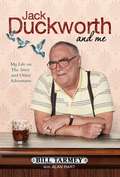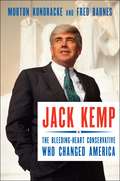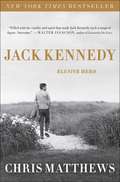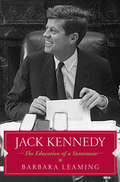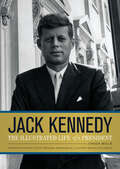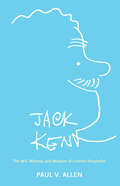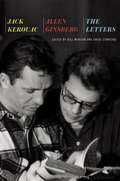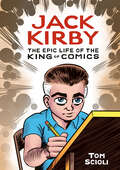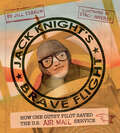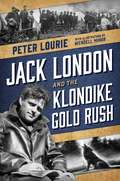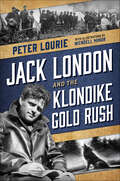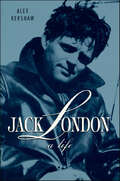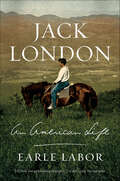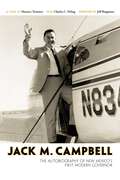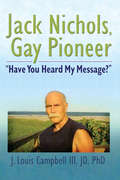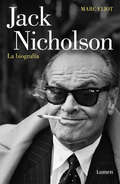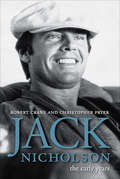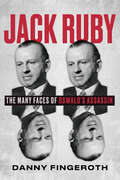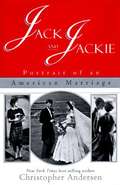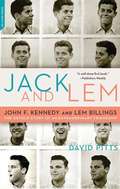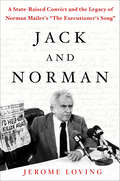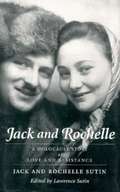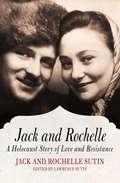- Table View
- List View
Jack Duckworth and Me
by Bill TarmeyActor Bill Tarmey first appeared as Jack Duckworth in Coronation Street in November 1979, when his formidable on-screen wife Vera dragged him to Brian and Gail Tilsley's wedding, only to have him sneak off for a pint at the first opportunity. After playing what is arguably the nation's best-loved soap character for 31 years, Bill leaves the series in December 2010. To coincide with this momentous event in soap history, Bill now tells the full story of what it has been like to play this loveable rogue for almost half his life. He reveals the hilarious on-set japes behind the scenes - such as getting fits of the giggles with Curly Watts and Alec Gilroy, what it was like playing the Romeo to Bet Lynch and Dulcie Froggat, plus the more emotional times such as when Bernard Youens, who played Stan Ogden, died. There is also the fascinating story of Bill's early years growing up in the streets of post-war Manchester, with bombsites for playgrounds and an ex-Navy grandpa who taught him how to box. Destined to become a master asphalter like his Dad, Bill never gave up his love of singing, and by the late 1960s he had made a name for himself in the unforgiving environment of the Working Men's Club circuit. Taking work as a TV extra, Bill soon found himself treading the famous cobbled streets, and was a natural in his newly created role of Jack, which has been uncanny in mirroring Bill's own life for its lurches of fortune. Packed with anecdotes to delight both Corrie fans and lovers of British TV everywhere, this warm-hearted and substantial autobiography is THE soap star memoir the country has been waiting for. They will not be disappointed.
Jack Kemp
by Morton Kondracke Fred BarnesThe definitive biography of Jack Kemp, and why his legacy matters to today's GOP.As today's Republicans struggle to broaden their base and promote reform, some are reviving the legacy of Jack Kemp, one of the most important Republicans of the 1970s, 80s, and 90s.Kemp approached politics the same way he played quarterback for the Bills: with a refusal to accept defeat. Yet he was also willing to compromise to get things done, and his commitment to the working class and minorities attracted voters who usually rejected the GOP. He was instrumental in helping Ronald Reagan create an era of sustained and widespread prosperity.Drawing on never-published papers and the Kemp oral history project, noted journalists Morton Kondracke and Fred Barnes trace Kemp's whole life, from his childhood through his pro football career to his unusually influential years as congressman and cabinet secretary. Despite many ups and downs, including failed presidential and vice presidential bids, Kemp proved that a "bleeding-heart conservative" could redefine what was possible in American politics.From the Hardcover edition.
Jack Kennedy: Elusive Hero
by Chris Matthews"What was he like?"Jack Kennedy said the reason people read biography is to answer that basic question. With the verve of a novelist, Chris Matthews gives us just that. We see this most beloved president in the company of friends. We see and feel him close-up, having fun and giving off that restlessness of his. We watch him navigate his life from privileged, rebellious youth to gutsy American president. We witness his bravery in war and selfless rescue of his PT boat crew. We watch JFK as a young politician learning to play hardball and watch him grow into the leader who averts a nuclear war.What was he like, this person whose own wife called him "that elusive, unforgettable man"? The Jack Kennedy you discover here wanted never to be alone, never to be bored. He loved courage, hated war, lived each day as if it were his last.Chris Matthews's extraordinary biography is based on personal interviews with those closest to JFK, oral histories by top political aide Kenneth O'Donnell and others, documents from his years as a student at Choate, and notes from Jacqueline Kennedy's first interview after Dallas. You'll learn the origins of his inaugural call to "Ask what you can do for your country." You'll discover his role in the genesis of the Peace Corps, his stand on civil rights, his push to put a man on the moon, his ban on nuclear arms testing. You'll get, more than ever before, to the root of the man, including the unsettling aspects of his personal life. As Matthews writes, "I found a fighting prince never free of pain, never far from trouble, never accepting the world he found, never wanting to be his father's son. He was a far greater hero than he ever wished us to know."
Jack Kennedy: The Education of a Statesman
by Barbara Leaming"An absorbing and enjoyable book."--New York Times Book Review Drawing on new primary sources, this biography is the first to detail the influence of British history, literature, and culture--in particular, the ideas of Winston Churchill--on America's thirty-fifth president. For the first time we trace the friendships and forces that led to the White House and shaped Kennedy's actions there. In this intimate portrait of a leader torn between politics and principle, we finally come to know the man Kennedy wanted to be and to understand his long, private struggle to become that man.
Jack Kennedy: The Illustrated Life of a President
by Chuck WillsThe presidential scholar shares an intimate visual biography of JFK through personal photos, diary entries, and other rare memorabilia. Until his inspiring life was tragically cut short, John F. Kennedy commanded the world’s attention. Today, his legacy is still very much alive. In this fascinating volume, Chuck Wills presents an inspiring and uniquely personal chronicle of the president’s life. Jack Kennedy includes everything from doodles and diary entries to drafts of major addresses. Hundreds of photographs and a compelling narrative uncover the remarkable tale of an intensely private man, from his rivalry with his older brother and his persistent courtship of Jackie to the inner workings of a historical presidency.
Jack Kent: The Wit, Whimsy, and Wisdom of a Comic Storyteller
by Paul V. AllenJack Kent (1920–1985) had two distinct and successful careers: newspaper cartoonist and author of children’s books. For each of these he drew upon different aspects of his personality and life experiences. From 1950 to 1965 he wrote and drew King Aroo, a nationally syndicated comic strip beloved by fans for its combination of absurdity, fantasy, wordplay, and wit. The strip’s DNA was comprised of things Kent loved—fairytales, nursery rhymes, vaudeville, Krazy Kat, foreign languages, and puns. In 1968, he published his first children’s book, Just Only John, and began a career in kids’ books that would result in over sixty published works, among them such classics as The Fat Cat and There’s No Such Thing as a Dragon. Kent’s stories for children were funny but often arose from the dark parts of his life—an itinerant childhood, an unfinished education, two harrowing tours of duty in World War II, and a persistent lack of confidence—and tackled such themes as rejection, isolation, self-doubt, and the desire for transformation.Jack Kent: The Wit, Whimsy, and Wisdom of a Comic Storyteller illuminates how Kent’s life experiences informed his art and his storytelling in both King Aroo and his children’s books. Paul V. Allen draws from archival research, brand-new interviews, and in-depth examinations of Kent’s work. Also included are many King Aroo comic strips that have never been reprinted in book form.
Jack Kerouac and Allen Ginsberg
by Jack Kerouac Allen GinsbergThe first collection of letters between the two leading figures of the Beat movement Writers and cultural icons Jack Kerouac and Allen Ginsberg are the most celebrated names of the Beat Generation, linked together not only by their shared artistic sensibility but also by a deep and abiding friendship, one that colored their lives and greatly influenced their writing. <P><P>Editors Bill Morgan and David Stanford shed new light on this intimate and influential friendship in this fascinating exchange of letters between Kerouac and Ginsberg, two thirds of which have never been published before. <P><P>Commencing in 1944 while Ginsberg was a student at Columbia University and continuing until shortly before Kerouac's death in 1969, the two hundred letters included in this book provide astonishing insight into their lives and their writing. While not always in agreement, Ginsberg and Kerouac inspired each other spiritually and creatively, and their letters became a vital workshop for their art. <P><P>Vivid, engaging, and enthralling, Jack Kerouac and Allen Ginsberg: The Letters provides an unparalleled portrait of the two men who led the cultural and artistic movement that defined their generation. .
Jack Kirby: The Epic Life of the King of Comics [A Graphic Biography]
by Tom ScioliTold in vivid graphic novel form by a groundbreaking Eisner-nominated comics creator, the long-overdue biography of the legend who co-created Captain America, Iron Man, Black Panther, the Fantastic Four, the X-Men, and many more superhero favorites.&“A fast-paced celebration of an underheralded legend within the comic-book industry.&”—Kirkus ReviewsNAMED ONE OF THE BEST BOOKS OF THE YEAR BY LIBRARY JOURNALThis sweeping, full-color comic book biography tells the complete life story of Jack Kirby, co-creator of some of the most enduring superheroes and villains of the twentieth century for Marvel Comics, DC Comics, and more. Critically acclaimed graphic novelist Tom Scioli breathes visual life into Kirby's life story--from his days growing up in New York during the Great Depression and discovering a love for science fiction and cartoons to his time on the frontlines in the European theatre of World War II where he experienced the type of action and adventure he'd later imbue his comic pages with, and on to his world-changing collaborations at Marvel with Stan Lee, where the pair redefined comics as a part of pop culture.Just as every great superhero needs a villain to overcome, Kirby's story also includes his struggles to receive the recognition and compensation that he believed his work deserved. Scioli captures his moves from Marvel to DC and back again, showing how Kirby himself and later his family fought to preserve his artistic legacy.Drawn from an unparalleled imagination and a life as exciting as his comic book tales, Kirby's super-creations have influenced subsequent generations of creatives in the comics field and beyond. Now, readers can experience the life and times of a comics titan through the medium that made him famous.
Jack Knight's Brave Flight: How One Gutsy Pilot Saved the US Air Mail Service
by Jill EsbaumHigh-flying history is brought to life in this suspenseful story of an unknown and daring pilot named Jack Knight, who in 1921 flew his biplane straight into a blizzard over America's heartland and saved the US Air Mail Service in the process.When Jack Knight takes off in his biplane from North Platte, Nebraska, in 1921, hundreds of people crowd the airstrip. Is Jack transporting a famous passenger? Is he ferrying medicine for a sick child? Nope--Jack has six sacks of mail. For the past few years, biplanes like Jack's have been flying the mail only during daylight hours. Flying after dark is risky and crashes are too common, so lawmakers decide to cut funding for the US Air Mail Service. Outraged officials and pilots want to prove that flying the mail is best, so they concoct a plan--a coast-to-coast race. But when a crash, exhaustion, and a snowstorm ground three of the planes, Jack Knight becomes the race's only hope. All he has to do is fly all night long, leaning out of the plane to see, and navigate a blizzard over land he's never covered with an empty fuel tank. Will Jack pull it off and save the Air Mail Service?
Jack London And The Klondike Gold Rush
by Wendell Minor Peter LourieSwept up in the Gold Rush of 1897, young Jack London headed north to strike it rich in the Klondike and discovered something more precious than gold—the seeds of the stories that would flower into his classic novels The Call of the Wild and White Fang, and timeless short stories such as "To Build A Fire." This gripping tale follows London as he treks up the ruthless Chilkoot Trail, braves the lethal Whitehorse Rapids, survives a bad case of scurvy, and conquers many more dangers of the Yukon during his quest for gold.
Jack London and the Klondike Gold Rush
by Peter LourieHere is a compelling middle grade nonfiction tale of how one classic writer drew upon a rugged life of adventure to create works of literature, punctuated by stunning black-and-white art by Wendell Minor and illustrative photographic material.Swept up in the Gold Rush of 1897, young Jack London headed north to strike it rich in the Klondike and discovered something more precious than gold—the seeds of the stories that would flower into his classic novels The Call of the Wild and White Fang, and timeless short stories such as "To Build A Fire." This gripping tale follows London as he treks up the ruthless Chilkoot Trail, braves the lethal Whitehorse Rapids, survives a bad case of scurvy, and conquers many more dangers of the Yukon during his quest for gold. A Christy Ottaviano Book
Jack London: A Life
by Alex KershawRaised in poverty as an illegitimate child, Jack London dropped out of school to support his mother, working in mind-deadening jobs that would foster a lifelong interest in socialism. Brilliant and self-taught, he haunted California's waterside bars, brawling with drunken sailors and learning about love from prostitutes. His lust for adventure took him from the beaches of Hawaii to the gold fields of Alaska, where he experienced firsthand the struggles for survival he would later immortalize in classics like White Fang and The Call of the Wild.A hard-drinking womanizer with children to support, Jack London was no stranger to passion when he met and married Charmian Kittredge, the love of his life. Despite his adventurous past, London had never before met a woman like Charmian; she adored fornication and boxing, and willingly risked life and limb to sail and explore. She typed his manuscripts while he churned out novels, serving as his inspiration and his critic.Lover, fighter, and onetime hobo, Jack London lived large and died before he was forty. This is a rare biography, from bestselling historian Alex Kershaw, that proves the truth can be more fascinating--and a far greater adventure--than a fiction.
Jack London: An American Life
by Earle LaborA revelatory look at the life of the great American author—and how it shaped his most beloved worksJack London was born a working class, fatherless Californian in 1876. In his youth, he was a boundlessly energetic adventurer on the bustling West Coast—an oyster pirate, a hobo, a sailor, and a prospector by turns. He spent his brief life rapidly accumulating the experiences that would inform his acclaimed bestselling books The Call of theWild, White Fang, and The Sea-Wolf.The bare outlines of his story suggest a classic rags-to-riches tale, but London the man was plagued by contradictions. He chronicled nature at its most savage, but wept helplessly at the deaths of his favorite animals. At his peak the highest paid writer in the United States, he was nevertheless forced to work under constant pressure for money. An irrepressibly optimistic crusader for social justice and a lover of humanity, he was also subject to spells of bitter invective, especially as his health declined. Branded by shortsighted critics as little more than a hack who produced a couple of memorable dog stories, he left behind a voluminous literary legacy, much of it ripe for rediscovery.In Jack London: An American Life, the noted Jack London scholar Earle Labor explores the brilliant and complicated novelist lost behind the myth—at once a hard-living globe-trotter and a man alive with ideas, whose passion for seeking new worlds to explore never waned until the day he died. Returning London to his proper place in the American pantheon, Labor resurrects a major American novelist in his full fire and glory.
Jack M. Campbell: The Autobiography of New Mexico's First Modern Governor
by Jack M. CampbellJack M. Campbell (1916–1999) was elected governor of New Mexico in 1962 and reelected in 1964, the first New Mexico governor in twelve years to win a second term. In this engaging autobiography, Campbell traces his life story across major historical events in the country and New Mexico. From humble beginnings on the plains of Kansas through his career as an FBI agent and his first days practicing law in Albuquerque, Campbell writes of his early attraction to the beauty and culture of New Mexico. After serving in the US Marine Corps in World War II, he returned to New Mexico and devoted himself to improving the state&’s political and economic circumstances as a legislator, governor, and private citizen. Through a series of impressive accomplishments, he succeeded in bringing the state fully into the twentieth century. Campbell truly was New Mexico&’s first modern governor.
Jack Nichols, Gay Pioneer: "Have You Heard My Message?"
by J. Louis Campbell IIIOne of the founders of the gay and lesbian liberation movement, Jack Nichols was a warrior for gay equality. Recounting his life and work, Jack Nichols, Gay Pioneer: “Have You Heard My Message?” skillfully weaves the story of a man, a movement, and a moment that shaped gay and lesbian history. This powerful biography captures the wisdom, passion, and spirit of a prolific activist and inspirational human being who refused to be silent in a society that considered homosexuality to be sinful and criminal. As a journalist, activist, and editor of the first gay weekly newspaper in the United States, Jack Nichols left a legacy of gay rights, gay pride, and tremendous courage. Covering episodes before and after Stonewall, during the AIDS epidemic, and beyond, Jack Nichols, Gay Pioneer charts the life of this pivotal figure from his childhood in the suburbs of Washington, DC, to his final impassioned days in a Florida cancer treatment center in 2005. This book also explores Nichols’ family history and its unique influence on his activist tendencies, as well as his revolutionary relationship with Lige Clark and their status as “the most famous homosexuals in America.” Thoughtful and moving, Jack Nichols: Gay Pioneer also includes the ideas Nichols used to bring the movement to critical mass, and the sources that were influential to his work. Some of the topics detailed in this book are the early influence of Burns and Whitman on the homosexual movement, the integration of androgyny and anarchism into his activist philosophy, his attack on the psychiatric establishment’s theory of homosexuality as a “sickness”, and his work and vision in men’s liberation. Jack Nichols, Gay Pioneer: “Have You Heard My Message?” offers a compelling look at the man and the movement, as well as a wealth of hard-to-find summaries on underground gay journalism, detailed references, personal photographs, and a complete bibliography of Nichols’s major writings. This book is an indispensable resource for anyone interested in the history and future of LGBT movements, as well as students, educators, and researchers seeking a comprehensive and thorough treatment of this revolutionary figure.
Jack Nicholson, la biografía
by Marc EliotNicholson, la biografía es un homenaje a un gran actor y un tributo atento e irónico a una vida de película. «Solo tiene sentido mentirle a dos personas: a tu chica y a la policía.»Jack Nicholson Durante cinco décadas, Jack Nicholson ha sido parte de la historia del cine. Con doce nominaciones a los Oscar en su haber e interpretaciones emblemáticas en películas como Easy Rider, El resplandor o Alguien voló sobre el nido del cuco , Nicholson es una leyenda viva, capaz de crear personajes memorables. Y su vida personal no ha sido menos intensa: Nicholson siempre ha estado en el centro de la elite de Hollywood y se ha relacionado con algunas de las mujeres más famosas y bellas del mundo. Basándose en años de extensa investigación, el aclamado biógrafo Marc Eliot arroja nueva luz sobre la vida de Nicholson, dentro y fuera de la pantalla. Desde su infancia en el seno de una familia de clase obrera de Nueva Jersey hasta las noches de desenfreno con amigos como Warren Beatty y sus relaciones tumultuosas con mujeres de la talla y el carácter de Anjelica Huston, pasando por sus trabajo a la orden de directores como Dennis Hopper, Stanley Kubrick o Roman Polanski.
Jack Nicholson: The Early Years (Screen Classics)
by Robert Crane Christopher FryerA biography based on personal interviews with the actor as well as his friends and fellow filmmakers: &“Entertaining . . . A must for cinema students.&” ―Hollywood Reporter In 1975, Jack Nicholson was just becoming a household name after starring in, writing, or producing twenty-five films including Easy Rider, Five Easy Pieces, The Last Detail, and Chinatown. At the time, Robert Crane and Christopher Fryer interviewed Nicholson for what began as a thesis for a University of Southern California film class—but quickly morphed into a larger portrait of Nicholson&’s unique craft. It would become the first book about the icon, and the only one done with his participation. Crane and Fryer conducted their interviews with Nicholson with the intent of showcasing the young star as he saw himself, while also interviewing many of Nicholson&’s close friends and fellow filmmakers, including Dennis Hopper, Roger Corman, Hal Ashby, Ann-Margret, Robert Evans, and Bruce Dern, providing a comprehensive profile of the actor's early years in the industry. The result is a unique portrait of the life and career of a man who has to date earned three Academy Awards and twelve nominations, seven Golden Globes, and the American Film Institute&’s Life Achievement Award. &“A true insider&’s look at Nicholson not only as a writer, director, and actor, but also as a private man who desires a private life.&” ―Los Angeles Daily News Includes photographs Originally published as Jack Nicholson: Face to Face
Jack Ruby: The Many Faces of Oswald's Assassin
by Danny FingerothJack Ruby changed history with one bold, violent action: killing accused presidential assassin Lee Harvey Oswald on live TV two days after the November 22, 1963, murder of President John F. Kennedy. But who was Jack Ruby—and how did he come to be in that spot on that day? As we approach the sixtieth anniversaries of the murders of Kennedy and Oswald, Jack Ruby's motives are as maddeningly ambiguous today as they were the day that he pulled the trigger. The fascinating yet frustrating thing about Ruby is that there is evidence to paint him as at least two different people. Much of his life story points to him as bumbling, vain, violent, and neurotic; a product of the grinding poverty of Chicago's Jewish ghetto; a man barely able to make a living or sustain a relationship with anyone besides his dogs. By the same token, evidence exists of Jack Ruby as cagey and competent, perhaps not a mastermind, but a useful pawn of the Mob and of both the police and the FBI; someone capable of running numerous legal, illegal, and semi-legal enterprises, including smuggling arms and vehicles to both sides in the Cuban revolution; someone capable of acting as middleman in bribery schemes to have imprisoned Mob figures set free. Cultural historian Danny Fingeroth's research includes a new, in-depth interview with Rabbi Hillel Silverman, the legendary Dallas clergyman who visited Ruby regularly in prison and who was witness to Ruby's descent into madness. Fingeroth also conducted interviews with Ruby family members and associates. The book's findings will catapult you into a trip through a house of historical mirrors.At its end, perhaps Jack Ruby's assault on history will begin to make sense. And perhaps we will understand how Oswald's assassin led us to the world we live in today.
Jack Tar's Story: The Autobiographies and Memoirs of Sailors in Antebellum America
by Myra C. GlennJack Tar's Story examines the autobiographies and memoirs of antebellum American sailors to explore contested meanings of manhood and nationalism in the early republic. It is the first study to use various kinds of institutional sources, including crew lists, ships' logs, impressment records, to document the stories sailors told. It focuses on how mariner authors remembered/interpreted various events and experiences, including the War of 1812, the Haitian Revolution, South America's wars of independence, British impressment, flogging on the high seas, roistering, and religious conversion. This book straddles different fields of scholarship and suggests how their concerns intersect or resonate with each other: the history of print culture, the study of autobiographical writing, and the historiography of seafaring life and of masculinity in antebellum America.
Jack The Ripper: The Facts
by Paul BeggFrom the Book Jacket: In the autumn of 1888 a series of prostitute murders in London's poverty-ridden East End caused a sensation around the world. The killer was never caught, perhaps never identified, but became known to posterity by the chilling nickname "Jack the Ripper." This book is the story of those murders, free of theories and speculation, by one of the world's most respected authorities on the subject. Paul Begg's fascinatingly detailed history makes extensive use of contemporary sources to bring the reader as close as possible to the times of the crimes. The murders, police investigation and reaction of the press and the people are reconstructed chronologically, and what is known of the lives of the tragic victims is fully discussed. The crimes' social background is examined in some detail, as are the reactions of ordinary people, the growing terror, what was happening on the streets, the pressures on the police and the political crisis the crimes nearly caused. Sticking to facts and avoiding speculation and theorising, Paul Begg takes a coolly objective look at leading police suspects, providing the reader with a meticulous analysis of what is known or can be deduced about Tumblety, Druitt, Ostrog, and particularly Kosminski, thought to be the Ripper by the head of the CID at the time. Filled with a great deal of new information-the book includes assessments of "popular" theories such as the Royal conspiracy, the so-called Maybrick diary, and the theory advanced by Patricia Cornwell in her best-selling Portrait of a Killer-Begg has produced a genuine history of one of Britain's most gruesome series of murders.
Jack and Jackie: Portrait of an American Marriage
by Christopher AndersenA revealing look at the private life of America's most adored first couple -- by an international best-selling author. Theirs was one of the great love stories of our time. Indeed, John Fitzgerald Kennedy and his wife, Jacqueline Lee Bouvier, captured and have held the world's imagination as perhaps no other husband and wife in modern history. Yet despite the billions of words that have been written about this most golden of couples, the true nature of their relationship has been veiled in mystery and mystique. Until now. With stunning information from important sources, some of whom were sworn to secrecy until Jackie's death in May 1994, and previously sealed archival material, international best-selling author Christopher Anderson examines their unique partnership and the courage, grace, and humor that defined it. Jack and Jackie is packed with startling revelations about the secrets and events that shaped their lives, including: --Never before known details of their courtship, from being caught by the police while necking in Jack's car to a behind-the-scenes look at their spectacular wedding --The world-famous women whose romances with JFK have previously been unreported, including Audrey Hepburn, Lee Remick and Sophia Loren -- Jackie's brief romance with William Holden, and at a low point in the marriage, with top Kennedy Administration official Roswell Gilpatric --New details about Jack's medical condition, and how the disturbing truth was concealed from the press and public --Their concerns about fertility, and Jackie's troubled pregnancies; the way Caroline and John Jr. transformed their lives -- and the touching story of how the death of their infant son Patrick brought Jack and Jackie closer than they had ever been, only months before Dallas. Sympathetic yet revealing, Jack and Jackie is more than just a portrait of a marriage. It goes beneath the surface to expose the complex emotional dynamics that fueled one of America's greatest relationships. --Over 50 black & white photos, many never before published!
Jack and Lem: John F. Kennedy and Lem Billings: The Untold Story of an Extraordinary Friendship
by David PittsA chronicle of the lifelong relationship between John F. Kennedy and his oldest friend, Lem Billings, a gay man, maintained despite the inherent political danger
Jack and Norman: A State-Raised Convict and the Legacy of Norman Mailer's "The Executioner's Song"
by Jerome LovingThis is the story of an author and his apprentice. It is the story of literary influence and tragedy. It is also the story of incarceration in America.Norman Mailer was writing The Executioner’s Song, his novel about condemned killer Gary Gilmore, when he struck up a correspondence with Jack Henry Abbott, Federal Prisoner 87098-132. Over time, Abbott convinced the famous author that he was a talented writer who deserved another chance at freedom. With letters of support from Mailer and other literary elites of the day, Abbott was released on parole in 1981. With Mailer’s help, Abbott quickly became the literary “it boy” of New York City. But in a shocking turn of events, the day before a rave review of Abbott’s book, In the Belly of the Beast, appeared in TheNew York Times, Abbott murdered a New York City waiter and fled to Mexico. Eerily, like Gary Gilmore in Mailer’s true-life novel, Abbott killed within six weeks of his release from prison. Now Jerome Loving explores the history of two of the most infamous books of the past 50 years, a fascinating story that has never before been told.
Jack and Rochelle: A Holocaust Story of Love and Resistance
by Jack Sutin Rochelle Sutin Lawrence SutinJack and Rochelle (Schleiff) Sutin tell their stories in tandem, through their son, of surviving World War II by hiding in the forests of Poland as resistance fighters against the Nazis, Polish collaborators, and antisemitic Russian partisans. They ultimately relocated to the U. S. and enjoyed a long, happy family life. The book includes a map of principal locations featured in the narrative, family photographs, drawings, and an insightful afterword about children of Holocaust survivors.
Jack and Rochelle: A Holocaust Story of Love and Resistance
by Jack Sutin Rochelle Sutin Lawrence SutinWhen the Holocaust descended on Poland, two young Jews fought back--and fell in love Jack and Rochelle first met at a youth dance in Poland before the war. They shared one dance, and Jack stepped on Rochelle's shoes. She was unimpressed. When the Nazis invaded eastern Poland in 1941, both Jack (in the town of Mir) and Rochelle (in the town of Stolpce) witnessed the horrors of ghettoization, forced labor, and mass killings that decimated their families. Jack and Rochelle managed, in their separate ways, to escape into the forest. They reunited, against all odds, in the winter of 1942-43 and became Jewish partisans who fought back against the Nazis. The couple's careful courtship soon blossomed into an enduring love that sustained them through the raging hatred of the Holocaust and the destruction of the lives they had known. Jack and Rochelle's story, told in their own voices through extensive interviews with their son, Lawrence, has been in print for twenty years and is celebrated as a classic of Holocaust memoir literature. This is the first electronic edition.
